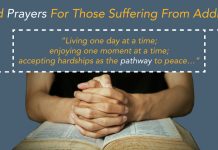A basic explanation of the what, how and why of this meaningful prayer.
Yizkor (remembrance) is the memorial service recited for deceased parents and other relatives at several points throughout the year. The name of the prayer means “May He remember” (“He” being God and “Yizkor” being the first word of the prayer). Not only do many who recite the prayer find it to be a moving, emotional experience, it also has the power to elevate spiritually the souls of the departed.
Yizkor is predicated on the Jewish concept of the immortality of the soul. Although the deceased can no longer perform mitzvot, they can benefit from prayers, acts of charity, and other good deeds that their survivors perform on their behalf. Yizkor is an excellent time for personal reflection and to commit to particular actions or general self-improvement as a source of merit for the departed.
The Yizkor prayer is typically preceded by an appeal in the synagogue. This is not a mercenary attempt to extort funds from a captive audience; committing to give charity is an inherent part of the Yizkor experience. If one says the prayer by himself at home, he should nevertheless commit to donate to an appropriate charity in the deceased’s memory.
What are the Origins of Yizkor? When is It Recited and Why?
There are four holidays on which we recite Yizkor. It is said on Yom Kippur, the last day of Passover, the second day of Shavuot and on Shemini Atzeret (a separate holiday at the end of Sukkot). (In Israel, where there is one day less of Yom Tov, Yizkor is recited on the seventh day of Passover and the only day of Shavuot; Shemini Atzeret and Simchat Torah are the same day in Israel.)
The original practice was to recite Yizkor only on Yom Kippur. This is because as “yom hakippurim” (“the day of atonements” – plural), the day effects atonement for both the living and the deceased. This is especially true through the act of giving charity, which is both an integral part of the atonement process and an important theme of the prayer Yizkor.
The roots of Yizkor are found in the Midrash Tanchuma (Ha’azinu 1), where it cites Deuteronomy 21:8, “Atone for Your people, Israel, whom You have redeemed.” We are told that the first part of the verse refers to the living of Israel, while the second part refers the deceased. The Midrash continues, “Therefore, our practice is to remember the deceased on Yom Kippur by pledging charity on their behalf.” We are then told not to think that charity no longer helps the departed. Rather, when one pledges charity on the deceased’s behalf, he ascends as quickly as an arrow shot from a bow.
Yizkor was extended from Yom Kippur alone to the Three Festivals, which is thematically appropriate. The Torah tells us (Deuteronomy 16:16-17) that when we make our pilgrimage to the Temple for the holidays, we are not to appear empty-handed. Each person was to make a donation according to his ability. We see from this that charity is also an integral part of the Festivals and therefore a fitting occasion for Yizkor with its emphasis on charity as a merit for the departed.
What Is in Yizkor?
Before starting Yizkor proper, many congregations recite a selection of Biblical verses pertaining to the nature of our lives and after-lives. (For example, “man’s days are like a shadow passing by” – Psalms 144:4; “God will redeem my soul from the depths” – Psalms 49:16, etc.) These verses are followed by the recitation of Psalm 91 (“Yosheiv Ba’seiser”), whose theme is that God is the refuge of mankind. After these readings, we’re ready to begin the actual prayer of Yizkor.
The theme of Yizkor is that we ask God to remember our relatives and to include them in the “bond of life” in paradise alongside the Patriarchs, Matriarchs and other departed righteous. In exchange for this, we commit (without making a vow) to donate charity on their behalf. The primary focus of Yizkor is on one’s parents, but it may also be recited on behalf of other relatives. The paragraphs in the siddur for father, mother and other close relatives have spaces where one can insert the names of the deceased. The Ashkenazic practice is to recite the name of the departed as the son or daughter of (their father’s name); other communities may use the name of the deceased’s mother.
Following Yizkor for one’s relatives, there are paragraphs for victims of the Holocaust and other martyrs.
After all of the Yizkor paragraphs, the prayer Keil Malei Rachamim (“God, full of compassion”) is recited. This prayer is the same one recited at a burial, an unveiling and during the Shabbos mincha service prior to the deceased’s Yahrtzeit. This is followed by the prayer Av Harachamim (“Father of compassion”), a memorial prayer recited on most Sabbaths. It may surprise some to hear that Kaddish is not part of the Yizkor service.
Should I Say Yizkor During the First Year? Should I Go Out if I’m Not Saying It?
A number of aspects of Yizkor are the subject of differences of opinion among the various authorities or matters of local custom. For example, some have the practice not to recite Yizkor during the first year following a death while the emotional wounds are still quite fresh. Others maintain that Yizkor should be recited during the first year the same as in all subsequent years.
One very familiar practice is for those not reciting Yizkor to leave the room while the mourners are saying it. Some will tell you that it is a sign of respect for one’s living parents not to remain inside while Yizkor is being recited for the deceased. Others will say that it is from fear of the ayin hara (“evil eye”) and that those with living parents go out so as not to tempt fate. Opponents of the practice say that going out is based on superstition and not recommended, or perhaps it’s just insensitive to those reciting it. Plus, there are prayers at the end that are recited for victims of the Holocaust and other martyrs; these apply to all members of the congregation, not just to those who have lost close family members. Some would advise staying inside in order to recite those prayers, or to go out and return for them.
In both of these matters, one should follow one’s own family custom or the practice of one’s community. If in doubt, ask your local rabbi.
Why is Shul So Crowded? Can Yizkor be Recited at Home?
It’s ironic that shuls become extra crowded because of a prayer that doesn’t need to be said with a minyan!
It is not uncommon that people who are not regular synagogue attendees will appear on days when Yizkor is recited. Of course there’s nothing wrong with this; it’s actually a wonderful thing that those who are not regular worshipers are willing to go the extra mile (sometimes literally) on behalf of relatives who are no longer with us. If anything, serving as the catalyst for their heirs to attend shul is a merit for the deceased. But if one cannot make it to shul, Yizkor can (and should) still be recited.
While it’s always preferable to pray in shul with a minyan, there are many legitimate reasons that prevent people from attending, such as infirmity or advanced age. If one cannot attend shul, there’s absolutely no reason not to say Yizkor in the privacy of one’s own home. And it is still appropriate to commit to donate to the synagogue or another worthy charity in merit of the departed.
Reprinted with permission from ou.org
www.aish.com
Prayer for the Death of a Pet
By Rabbi Barry H. Block
O Lord our God, we come before You this day in sadness. (Pet’s name), who brought us so much joy in life, has now died. (His/Her) happy times in our family’s embrace have come to an end. We miss (pet’s name) already.
Help us, O God, to remember the good times with (pet’s name). Remind us to rejoice in the happy times (he/she) brought to our home. Let us be thankful for the good life we were blessed to give to (him/her).
We are grateful to You, God, for creating (pet’s name), for entrusting (him/her) to our care, and for sustaining (him/her) in our love for a measure of time. We understand that all that lives must die. We knew that this day would come. And yet, O God, we would have wanted one more day of play, one more evening of love with (pet’s name).
O God, as we have taken care of (pet’s name) in life, we ask that You watch over (him/her) in death. You entrusted (pet’s name) to our care; now, we give (him/her) back to You. May (pet’s name) find a happy new home in Your loving embrace.
As we remember (pet’s name), may we love each other more dearly. May we care for all Your creatures, for every living thing, as we protected the blessed life of (pet’s name). May (his/her) memory bless our lives with love and caring forever. Amen.
SHARE THIS PAGE
www.sympathysolutions.com
Memorial Services
(
(Greek)
:
Μνημόσυνα
(mnemosyna, memorial) or
Παραστάς
(wake);
(Old Church Slavonic)
:
Паннихида
(Latinized as
Pannikhída ,
Pannichida , or
Panikhída ; from the Greek for “all the dead”) are special prayer services offered for the benefit of the departed.
Table of contents
Prayers and Almsgiving
Early Christians expressed their concern for the repose of the souls of their beloved by works of charity and love and by personal and communal prayers.
The Apostolic Constitutions recommended that part of the possessions of a dead person be distributed to the poor in his “memory”.
St. John Chrysostom, Jerome, Tertullian, and others also recommended alms giving in memory of the dead although they believe that this and other good works for the repose of the soul of the dead also benefit the doers.
Memorial Services with Kollyva Offerings
In the Orthodox Church the various prayers for the departed have as their purpose to pray for the repose of the departed, to comfort the living, and to remind those who remain behind of their own mortality, and the brevity of this earthly life. For this reason, memorial services have an air of penitence about them and tend to be served more frequently during the four fasting seasons (Great Lent, Nativity Fast, Apostles’ Fast and Dormition Fast).
According to the Apostolic Constitutions, memorial services may be held on the 3rd, 9th, and 40th day, and on the completion of a year from the day of death. These prescribed times are still observed in most Orthodox places.
The memorial service is most frequently served after the Divine Liturgy, however it may also be served after Vespers, Matins, or as a separate service by itself. For the memorial service, Kollyva, a ritual food of boiled wheat, is often prepared and is placed in front of the “memorial table” or an icon of Christ and is blessed by the priest afterwards.
The service is composed of Psalms, Ektenias (litanies), hymns and prayers. In its outline it follows the general outline of Matins, and is in effect a truncated funeral service. Some of the most notable portions of the service are the Kontakion of the Departed, and the final, slow and solemn singing of “Memory Eternal.”
The deacon (or, if there is no deacon the priest) will swing the censer throughout almost the entire service, and all will stand holding lighted candles. Near the end of the service, during the final Troparia, all will either put out their candles or will place them in candle holders on the memorial table. Each candle symbolizes the individual soul, which, as it were, each person holds in their own hand. The extinguishing (or giving up) of the candle at the end of the service symbolizes the fact that each person will have to surrender their soul at the end of their life.
Considering the fact that in the Orthodox Churches of the diaspora a memorial service with the participation of the congregation must be held on a Sunday, the 40th day memorial service is the one universally observed although by necessity, it may not be held exactly on the 40th day. Needless to say, the Orthodox people may give the names of their departed to be mentioned by the priest in the Eucharist at any time.
At Gravesites and Commemorative meals
Another kind of memorial was the gathering on the graves of the dead or in the church (funerals), and the serving of meals afterwards known as “makariai” (meals in memory of) that are still held by many in the church hall following burial.
In addition, it is also customary for the priest to pour wine, oil, and some of the Kollyva on the grave site, following memorial services in church.
At the Eucharist
Praying for the dead could include celebrating the Eucharist or could be a special service, as it is now, in which the names of the dead were mentioned, or it could be both.
St. Cyril of Jerusalem mentions the prayers offered for the benefit of all who have died in the faith of Christ, stating that their souls greatly benefit by the prayers of the Church and by offering the Bloodless Sacrifice for the repose of their souls.
St. John Chrysostom believes that “to mention the names of the departed in the awesome mystery of the Eucharist results in much benefit for the souls of the beloved.”
Above all, praying for the dead is a deeply rooted practice in the Church on the belief that the Church of Christ is constituted not only of her living members but also of her departed ones. The Bloodless Sacrifice of the Orthodox Eucharist, as articulated in all the Liturgies in use, is offered for the benefit of both dead and living faithful.
A Biblical basis for praying for the dead may be found in the Epistle of St. James, 5:16, by which the “prayer of a righteous man has great power in its effects.”
See also
- Kollyva
- Prayer for the Dead.
- Prayer
- Birnstan of Winchester
Wikipedia
- Memorial service (Orthodox)
Notes
- ↑ The non-canonical Acts of Paul and Thecla (New Testament Apocrypha) speak of the efficacy of prayer for the dead, so that they might be “translated to a state of happiness.” (Acts of Paul and Thecla, 8:5)
- ↑ For instance, the Memorial Service does not have the chanting of “God is the Lord…” as the Molieben does; but instead, the “Alleluia” is chanted, reminiscent of the “Alleluia” that is chanted at Lenten services.
- ↑ They are also commonly held on the third year anniversary. Some faithful will request a memorial every year on the anniversary of death.
- ↑ The memorial table is a small, free-standing table to which has been attached an upright crucifix, sometimes including also icons of the Theotokos (the Virgin Mary) and the Apostle John. The table will also have a place for the faithful to put lighted candles.
- ↑ From this comes the Greek name parastas which refers to standing all night in vigil, which in the early days was what literally took place.
- ↑ Kontakion of the Departed: “With the saints give rest, O Christ, to the soul(s) of Thy servant(s), where there is neither sickness, nor sorrow, nor sighing, but life everlasting.”
- ↑ Deacon: In blessed repose, O Lord, grant eternal rest unto Thy departed servant (Name) and make his/her memory to be eternal!
Choir: Memory eternal! Memory eternal! Memory eternal!
References
- ↑ Rev. Dr. Nicon D. Patrinacos (M.A., D.Phil. (Oxon)). A Dictionary of Greek Orthodoxy – Λεξικόν Ελληνικής Ορθοδοξίας. Light & Life Publishing, Minnesota, 1984. pp.249-250.
Sources
- Rev. Dr. Nicon D. Patrinacos (M.A., D.Phil. (Oxon)). A Dictionary of Greek Orthodoxy – Λεξικον Ελληνικης Ορθοδοξιας. Light & Life Publishing, Minnesota, 1984.
- Memorial service (Orthodox) at Wikipedia.
orthodoxwiki.org
A service of morning prayer including a memorial service for Aislinn Bleck, a member of the class 2017.
Daily Chapel is a time of inspiration for body, mind, and spirit; a quiet harbor in a busy day; worship. Students, faculty, and staff witness to their faith and invite the community to join them. All are welcome!
If you are unable to join us in person but would like to watch live or archived chapel services, please click the web link above.
+ Google Calendar+ iCal Export Details Date: December 8, 2017 Time:
10:10 am – 10:30 am
Event Category: Chapel Venue Boe Memorial Chapel Northfield, MN Related Events
wp.stolaf.edu











